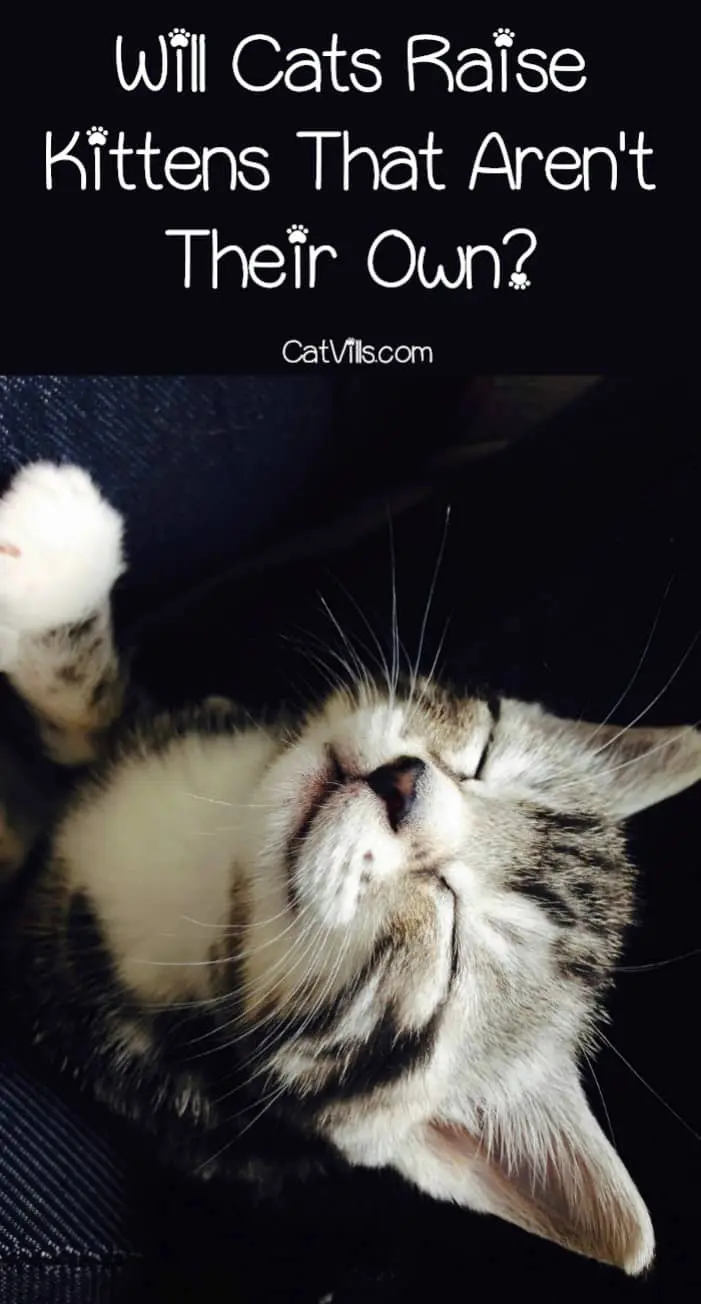Last Updated: 2 years ago
Will your cat raise kittens that aren’t her own? It depends on your cat’s personality and mood!
Find out more and learn what to do if your cat says “no way!” and rejects the kittens! When kittens are born, their mother cleans them off and begins caring for them immediately.
Her milk carries antibodies and nutrients that protect them for the first weeks of their lives, and the bond they share is a strong one.
She will learn the sound of their tiny cries as well as their scents, and they will learn hers. If they wander from the nesting area, she will retrieve them and gently pull them back in.
If their hiding place becomes unsafe, she will carry them painstakingly to a new location. She knows how many there are and what they are doing, and she will protect them with her life if necessary.
But sometimes something goes wrong. Some mother cats (also called queens) aren’t cut out for parenting; it isn’t really a decision they make consciously, after all.
A mother might reject her kittens for one reason or another, or one without strong protective instincts might flee the nest at the first sign of a predator and not return.
Worse yet, something could happen to the mother, and she might not be able to return to her brood.
Can Your Cat Raise Kittens That Aren’t Her Own?
So what happens to the babies, then? Unfortunately, sometimes they don’t fare well.
But if you are able to rescue them, there are things you can do to help them and give them the best chance you can.
Bottle feeding with a specially designed milk replacement for kittens,
Baby cat food (this is one stage younger than kitten food), using heating pads, blankets, etc.
If there are other cats around, though, you might have another option.
Cats may seem somewhat aloof, but they have incredibly strong maternal instincts. While the animal most likely to take in orphaned kittens is a queen with a litter of her own, that certainly isn’t the only possible combination.
First of all, cats have been known to take in orphans of all kinds of species, from other cats’ kittens to puppies, bunnies, mice, squirrels, birds (including ducklings), and even hedgehogs.
Even if they cannot nurse the babies—and they most likely will if they can—cats will often care for them and even raise them alongside their own family.
The fact that cats will nurse and raise an animal that would normally be prey reinforces how amazing we all know these creatures really are.
In many cases, cats who get along will share parenting tasks for kittens, even nursing each other’s babies if they’re able.
I know of two female indoor/outdoor farm cats who used to do just that.
Being not quite barn cats and not quite house cats, these two had many litters over the years. One of them was a wonderful mother, and the other was not so much.
The more maternal of the two would retrieve the other’s kittens (she never put up any fights about it), nurse them, and raise them as her own. The kittens did just fine—far better than they likely would have if they had been left with their own mother, who had an attention span comparable to that of a goldfish.
Obviously, however, most people don’t just happen to have a nursing mother cat in their back pocket for such a situation, but you may be surprised at how nurturing non-nursing cats can be.
Cats who do not have, or have never had, a litter of their own can make wonderful adoptive parents.
My parents had a cat that they adopted at eight weeks old. She adjusted quickly to the household but mostly ignored their other cats.
Then they adopted another kitten. In this case, the new kitten was old enough to be without a mother, but Lily, the original, wouldn’t hear of it. She decided then and there that this new kitten was her baby, plain and simple.
From the first day, Lily would follow “her” baby around, curling up with her to sleep, bathing her, and even supervising her litterbox habits.
Years later, Lily still believes Salem to be her baby, and we really can’t sort out how since we know for a fact that she’s never had kittens.
Even more surprising is that parenting skills are not just limited to female cats.
While in feral colonies male cats can be a terrible threat to kittens—even their own—domestic male cats may have a different reaction to young.
I have an elderly male cat who is always extremely cranky when we first bring a new cat into the household, but he’s the first to come around every time.
We have two now-grown cats that we have never been able to convince him were not his babies; the good thing is that they don’t seem to know he isn’t either, so it works out just fine.
The helplessness of an infant is something that few creatures can resist; many animals will care for the young of others, whether of their own species or otherwise. It’s nature’s method of ensuring survival, but it’s also very, very sweet.
Have you ever had a cat raise kittens that weren’t her own? Share your experiences below!

